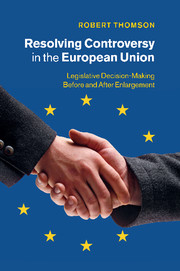 Resolving Controversy in the European Union
Resolving Controversy in the European Union Book contents
- Frontmatter
- Contents
- Figures
- Tables
- Acknowledgements
- 1 Introducing the political system of the European Union
- 2 Research design: measuring controversy spatially
- Part I Inputs
- Part II Processes
- Part III Outputs
- 10 Decision outcomes
- 11 Delegation
- 12 Evaluating and improving the European Union
- Appendix The selection of legislative proposals
- References
- Index
10 - Decision outcomes
from Part III - Outputs
Published online by Cambridge University Press: 07 October 2011
- Frontmatter
- Contents
- Figures
- Tables
- Acknowledgements
- 1 Introducing the political system of the European Union
- 2 Research design: measuring controversy spatially
- Part I Inputs
- Part II Processes
- Part III Outputs
- 10 Decision outcomes
- 11 Delegation
- 12 Evaluating and improving the European Union
- Appendix The selection of legislative proposals
- References
- Index
Summary
Winners and losers with respect to decision outcomes
To what extent are there differences among actors in the congruence between their policy positions and decision outcomes across a broad range of controversial issues? When the decision-making process transforms diverse and competing policy demands into a single decision outcome, some actors might lose more than others. Losers with respect to one decision outcome may be winners with respect to other decision outcomes. The above question directs our attention to the incongruence between demands and outcomes across a range of controversies, which is obviously distinct from who wins and loses on any specific controversy. The answer to this descriptive question is relevant to the legitimacy of the European Union (EU). Whether a political system is legitimate or not is defined by relevant actors’ perceptions; a regime is not legitimate unless it is ‘reasonable from every individual’s point of view’ (D’Agostino 2008). The relevant individuals in this context must include the decision makers in the Commission, European Parliament (EP) and Council. In a representative system such as the EU, these actors are charged with representing a range of interests. Decision makers’ perceptions of legitimacy are conditioned by the extent to which decision outcomes differ from their policy demands. Suppose that decision outcomes across a range of issues failed to reflect a particular member state’s policy demands. Over time, the representatives of the disadvantaged member state would come to believe that the system was biased against their state’s interests.
Political actors may use different logics to evaluate the fairness of decision outcomes in relation to their policy demands (Barry 1989). According to the logic of mutual advantage, actors are concerned that they gain at least as much as other actors, and preferably more. From this perspective, actors consider whether decision outcomes are at least as congruent with their own policy demands as they are with those of other actors. According to the logic of impartiality, actors are not concerned that they gain at least as much as others, but rather that outcomes can be approved of on a footing of equality. Whichever logic is applied, actors’ judgements are conditioned by comparisons of decision outcomes with the diverse policy demands expressed by all actors.
- Type
- Chapter
- Information
- Resolving Controversy in the European UnionLegislative Decision-Making before and after Enlargement, pp. 229 - 251Publisher: Cambridge University PressPrint publication year: 2011
